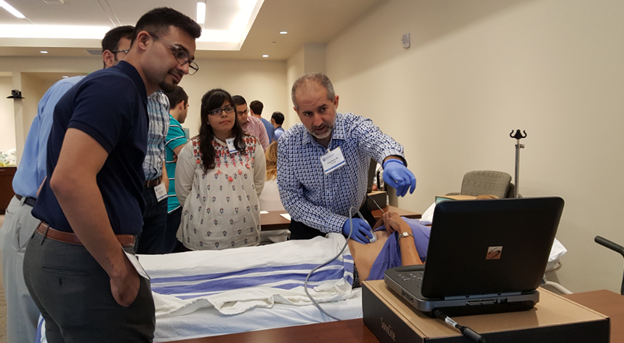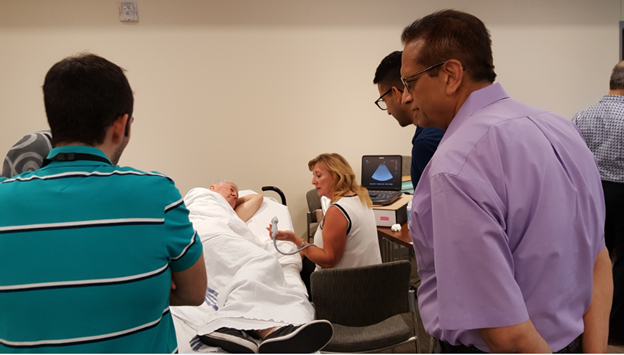The program provides a minimum of 18 months of clinical experience, in various rotations and clinics, leading to board certification in both pulmonary disease and critical care medicine.
Training in Pulmonary Medicine
At least, nine months of clinical experience are dedicated to pulmonary disease. The objective of this educational activity is to provide opportunities to manage inpatients and outpatients with a wide variety of pulmonary diseases and sleep disorders. Two continuity clinics offer the opportunity for longitudinal care of acutely and chronically ill patients. Pulmonary physiology is continuously emphasized and correlated with clinical disorders. The training in pulmonary medicine include the following:
- In-Patient Pulmonary Disease
- Pulmonary Consult Service
- Pulmonary Physiology Rotation
- Pulmonary Procedure Rotation
- Ambulatory Pulmonary Disease
- Continuity Clinic
- VAMC Chest Medicine Clinic
- OUPB Pulmonary Clinic
- Subspecialty Clinics
- Sleep Medicine Clinic
- Pulmonary Oncology Clinic
- Adult Cystic Fibrosis Clinic
- Pulmonary Hypertension Clinic
- Amyotrophic Lateral Sclerosis Clinic
- Interstitial Lung Disease Clinic
- Sarcoidosis Clinic
- Subspecialty Electives
- Pulmonary Rehabilitation
- Interventional Pulmonology
- Thoracic Radiology
- Point of Care Ultrasound
- Allergy/Immunology
- Anesthesia
- Research
- Pulmonary Procedural Training
- Outpatient procedure/Interventional Pulmonology Rotation
- Point of Care Ultrasound Workshop
- Bronchoscopy/EBUS Simulation Training
- Out-of-OR Airway Management Simulation Training
- Central Venous Catheter Workshop
Training in Critical Care Medicine
The critical care training is structured to provide at least nine months of meaningful patient care responsibility in the intensive care unit with at least six months spent caring for critically ill medical patients and three months devoted to the care of non-medical ICU patients. The objectives of the medical ICU rotation are to allow the trainee to provide ongoing care to a wide variety of critically ill patients, develop appropriate skills for making an accurate diagnosis, learn how to prioritize areas of urgency, and apply appropriate therapy to assist these patients.
- Critical Care Medicine Rotations
- Medical ICU Rotation DAY
- Medical ICU Rotation NIGHT
- Neuro-Critical Care Rotation
- Subspecialty Electives
- Trauma-ICU
- Point of Care Ultrasound
- Anesthesia
- Procedural Training
- Point of Care Ultrasound Workshop
- Central Venous Catheter Workshop
- Out-of-OR Airway Management Simulation Training

